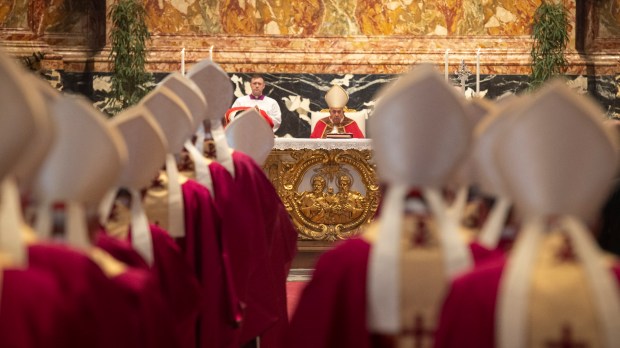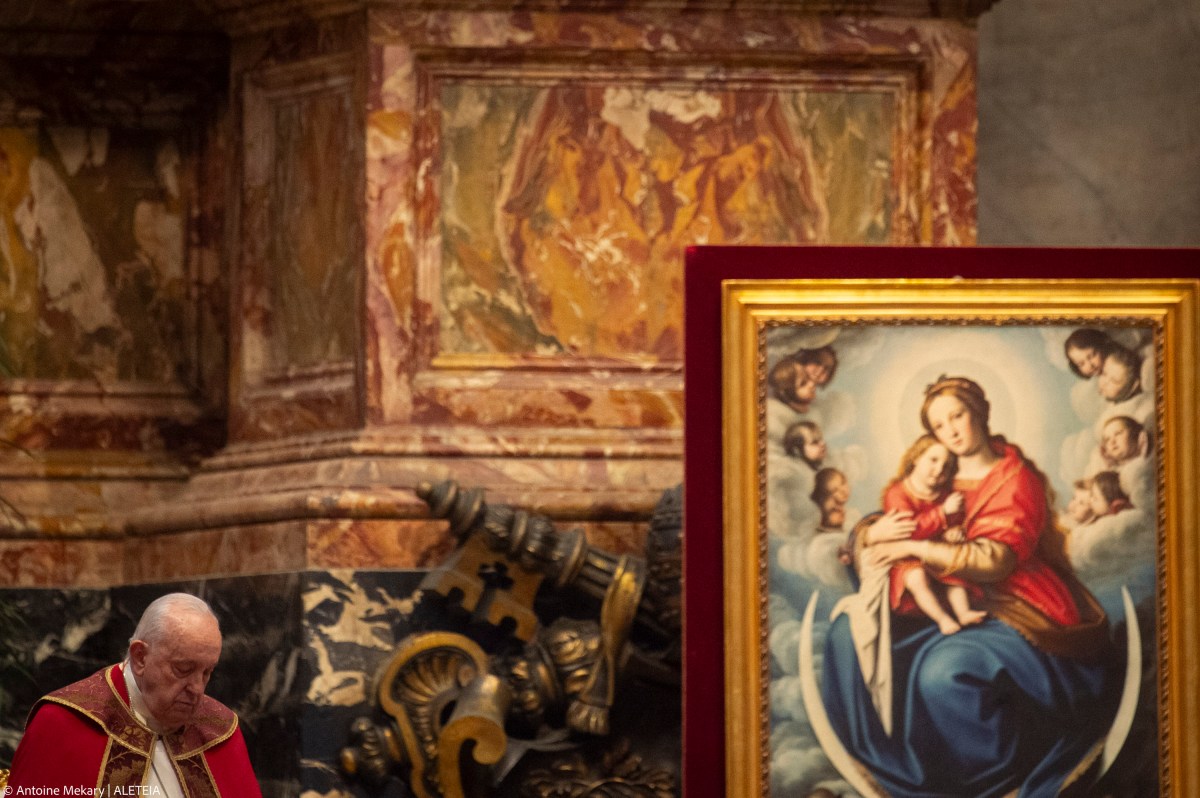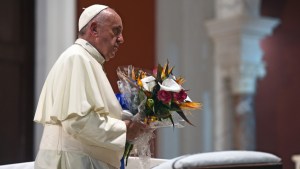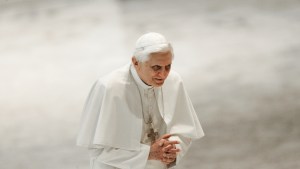Pope Francis celebrated Mass in St. Peter’s Basilica today for Benedict XVI and all those bishops and cardinals who have died in the past year. This Mass is an annual tradition around the date of All Souls Day, when the Church prays for the souls of the dead.
Here is a Vatican translation of his homily:
~
Jesus is about to enter Nain; the disciples and “a great crowd” are walking with him (cf. Lk 7:11). As he approaches the city gate, another procession is setting out, but in the opposite direction: It is going to bury the only son of a widowed mother. The Gospel tells us that, “when the Lord saw her, he had compassion” (Lk 7:13). Jesus saw what happened and he was moved by compassion. Benedict XVI, whom we remember today, together with the Cardinals and Bishops who died in the past year, wrote in his first Encyclical that the programme of Jesus is “a heart that sees” (Deus Caritas Est, 31). How many times did he keep reminding us that faith is not primarily an idea to be understood or a moral precept to be followed, but a person to be encountered. That person is Jesus Christ, whose heart beats with love for us, whose eyes look with pity upon our suffering.
The Lord halts before the tragedy of death. It is significant that this is the first time that Luke’s Gospel calls Jesus “Lord”: “the Lord was moved with great compassion.” He is called Lord – the God who exercises lordship over all things – in the very act of showing compassion for a widowed mother who lost, along with her only son, her reason for living. Here we see our God, whose divinity shines forth in contact with our sorrow and grief, for his is a heart full of compassion. The raising of that young man, the gift of life that overcomes death, has its source precisely there, in the compassion of the Lord, who is moved by death, the greatest cause of our suffering. How important it is to communicate that same look of compassion to all those who grieve for the death of their loved ones!
Jesus’ compassion is concrete. The Gospel tells us that he “came forward and touched the bier” (cf. Lk 7:14). He did not have to do that, and in any event, in those days, touching the bier of a dead person was considered something unclean, defiling those who did so. Jesus, however, cares nothing about that; his compassion makes him reach out to all those who suffer. That is God’s “style,” one of closeness, compassion, and tenderness. And one of few words. Christ does not start preaching about death, but simply tells the young man’s mother: “Do not weep!” (Lk 7:13). Why? Is it wrong to weep? No, Jesus himself weeps in the Gospels. He says to the mother, “Do not weep,” because with the Lord tears do not last forever; they have an end. Jesus is the God who, as Scripture prophesies, will “swallow up death” and “wipe away tears from all faces” (Is 25:8; cf. Rev 21:4). He has made our tears his own in order to take them away.
Yet here, unlike other miracles he performed, Jesus does not first ask the mother to have faith. Why this extraordinary and unusual miracle?
Here, then, we see the Lord’s compassion, which leads him to raise that young son. Yet here, unlike other miracles he performed, Jesus does not first ask the mother to have faith. Why this extraordinary and unusual miracle? Because it has to do with an orphan and a widow, those whom the Bible, along with strangers, considers most alone and forsaken, having no one else to trust but God. The widow, the orphan, the stranger: These are the people closest and dearest to the Lord. We cannot be close and dear to God if we ignore those who enjoy his protection and preferential love, for one day they will be the ones to welcome us to heaven: the widow, the orphan, the stranger.
Considering them too, we discover another important point, which I would condense into today’s second word: humility. For the orphan and the widow are “the humble” par excellence: those who, placing all their hope in the Lord and not in themselves, have made God the center of their lives. They no longer rely on their own strength, but on him and his unfailing care. Rejecting any presumption of self-sufficiency, they recognize their need for God and put their trust in him. It is the humble, the poor in spirit, who reveal to us the “littleness” so pleasing to the Lord, the path that leads to heaven. God seeks the humble, those who hope in him and not in themselves and their own plans. Dear brothers and sisters, this is Christian humility, which is not simply one virtue among others, but the basic disposition of life: believing ourselves to be in need of God, making room for him and putting all our trust in him. This is Christian humility.
God loves humility because it permits him to interact with us.
God loves humility because it permits him to interact with us. Even more, God loves humility because he himself is humble. He comes down to us; he lowers himself; he does not impose himself; he makes room for us. God is not only humble; he is humility itself. “You are humility, Lord” was the prayer of Saint Francis of Assisi (Cf. Lodi: FF 261). We think of the Father, whose name is entirely a reference to the Son rather than to himself, and of the Son, whose name is completely in relation to the Father. God loves those who do not put themselves at the center: the humble, who most resemble him. That is why, as Jesus says, “those who humble themselves will be exalted” (Lk 14:11). I like to recall the very first words with which Pope Benedict described himself following his election: “a humble labourer in the vineyard of the Lord.” Indeed, Christians, especially the Pope, the Cardinals and the Bishops, are called to be humble labourers: to serve, not to be served and to put the fruits of the Lord’s vineyard before their advantage. What a fine thing it is to renounce ourselves for the Church of Jesus!
Brothers and sisters, let us ask God to grant us a compassionate gaze and a humble heart. May we never tire of asking this, for it is on the path of compassion and humility that the Lord gives us his life, which triumphs over death. Let us pray for our beloved deceased brethren. Their hearts were pastoral, compassionate and humble, for the Lord was the center of their lives. In him may they find eternal peace. May they rejoice with Mary, whom the Lord raised up by looking upon her humility (cf. Lk 1:48).




